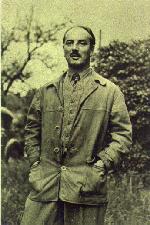

  |
Lewis MumfordA sketch of his work
|
|
Lewis Mumford spent nearly fifty years writing books on a range of
topics, including Technology (which he insisted on calling Technics), Architecture,
Towns and Cities, and Social Planning. He was one of the first writers
to take a serious historical look at the impact of technology on society.
He was a disciple of Sir Patrick Geddes, and corresponded with many important contemporaries, including Fred Osborne and Vannevar Bush. Much of his work is now out of print, but some of his more important books have been reprinted. I have found many of his books in second-hand bookshops. |

|
 |
Lewis Mumford on Designveryard projects > books > Lewis Mumford > design |
|
|
|
| Design
Creativity |
 |
Lewis Mumford on Historyveryard projects > books > Lewis Mumford > history |
|
|
|
| Magic
Superstition |
 |
Lewis Mumford on Bureaucracyveryard projects > books > Lewis Mumford > bureaucracy |
| The impersonal, bureaucratic order of the counting house
vied with monastic and military order in laying the foundations for the
inflexible discipline and impersonal regularity that has now gradually
extended itself to every aspect of institutional life in Western civilization.
This order has been smoothly translated into automatic machines and computers,
even more incapable of exercising humane judgement and discretion than
a trained clerk. The new bureaucracy devoted to managerial organization
and coordination again became a necessary adjunct to all large-scale, long-distance
enterprises: book-keeping and record-keeping set the pace, in standardized
uniformity, for all the other parts of the machine. The failure to reckon
with this mathematical aspect of mechanization, as a prelude to industrial
inventions, has resulted in a warped and one-sided picture of modern technics.
This account gives to specific tools and machines by themselves the priority
in effecting changes that first took place in the human mind and were translated
later into institutions and mechanisms.
Myth of the Machine, pp 278-9
|
| Precisely at a time when the expansion of bureaucratic
methods in business and government, and the expansion of large-scale manufacture
were making the whole routine of practical activity an ever deadlier grind,
Protestantism developed a special faculty for getting pleasure out of that
grind. ... Drudgery served the Protestant as a valuable mortification of
the flesh: valuable in a worldly as well as a spiritual sense, for unlike
the hair shirts and self-whippings of the mediaeval saint, his unflagging
concentration on dull work brought tangible profits.
Condition of Man, p 199
|
| Bureaucracy |
 |
Lewis Mumford on Time & Powerveryard projects > books > Lewis Mumford > time & power |
| "Speed ... is a function of effective power and in turn becomes one
of the chief means of ostentatiously displaying it.... Royal commands,
like urgent commands in the Army, must be performed 'on the double'. The
current commitment to supersonic locomotion as a status symbol, already
comically exposed in the intercontinental oscillations of the 'jet set'
in business and government, has its beginnings here."
Myth of the Machine p 205
Mumford goes on to compare the short time to build a pyramid
(under a despotic bureaucracy) with the centuries required for a mediæval
cathedral (in a Free city). |
| Lewis Mumford on Clocks
and the Industrial Revolution
Time |
 |
Lewis Mumford on Cultureveryard projects > books > Lewis Mumford > culture |
|
|
| top |  |
|
|
Copyright © 1999-2002 Veryard Projects Ltd http://www.veryard.com/books/mumford.htm |